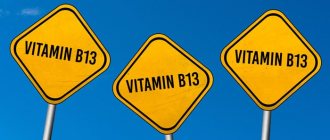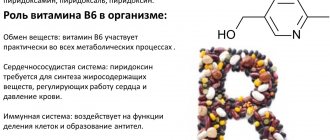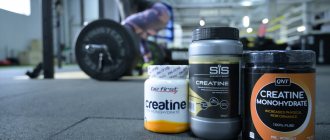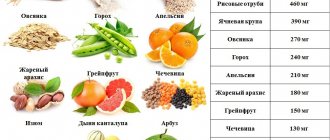Nervous stress, infertility, senile dementia, excess weight. Often troubles are associated with a deficiency of the valuable substance choline. Not all scientists consider it a vitamin, although in official pharmaceuticals it is included in the group of vitamins called B4. What food is the easiest way to get a microelement, how to determine a deficiency, when an excess occurs - we will tell you about all the properties of choline in our material.
Vitamin B4 is also called choline. Scientists discovered what this is at the end of the 19th century when studying animal bile. Then a trace element was found that perfectly protects human cell membranes from damage and destruction. From the Greek, the word “choly” is translated as bile, which is why the found trace element became known to everyone as “choline”.
In 1930, Vitamin B4, as they say, was revealed in all its glory: it was discovered that choline deficiency leads to dangerous consequences in the human body. From nervous system disorders to infertility. However, despite all its indispensability, not all pharmacists are inclined to call it a vitamin. What this is connected with, read below.
What is choline and what is it for?
Meet vitamin B4 (other names: choline, lipotropic factor, vitamin Bp).
Choline (or vitamin B4) was first discovered as a substance back in 1862, and its importance for humans was discovered during experiments in 1930. Choline belongs to the B vitamins, although according to some classifications it is classified as a vitamin-like substance. Choline, usually found along with inositol, is widely distributed in animal organisms. Vitamin B4 is soluble in water and is destroyed when exposed to high temperatures.
This vitamin plays an important role in the normal functioning of the nervous system. It is involved in the formation of the protective myelin sheath of nerves. The presence of choline in the body protects against the destruction of the myelin layer and damage to nerve cells. It is also an essential component of cell membranes.
Vitamin B4 is a precursor to the neurotransmitter acetylcholine, the most important neurotransmitter and transmitter of nerve impulses. Thus, it prevents nervous system disorders.
This vitamin is also a hepatoprotector, accelerating the structural restoration of damaged liver tissue due to the toxic effects of drugs, viruses, alcohol and drugs. It improves liver function and prevents the formation of gallstones.
This vitamin reduces cholesterol levels and the concentration of fatty acids in the blood, clears the walls of blood vessels from cholesterol plaques. It promotes the formation of methionine, which removes excesses of a special substance - homocysteine, which increases the risk of cardiovascular diseases. As a result, choline strengthens the heart muscle and normalizes heart rhythm.
In the pancreas, vitamin B4 is involved in carbohydrate metabolism. It strengthens the membranes of beta cells that produce insulin, thus normalizing blood sugar levels. In type I diabetes mellitus, choline consumption helps reduce the need for insulin. In type II diabetes mellitus, this vitamin helps compensate for the lack of polyunsaturated fatty acids in the body in order to reduce excess insulin levels (excess insulin is one of the factors in the development of type II diabetes mellitus).
This vitamin plays an important role in human reproduction. It is involved in the biosynthesis of prostaglandins in the prostate gland, increases sperm motility, and prevents disruption of the prostate gland in old age.
This vitamin stimulates the enzymatic breakdown of fats, normalizing fat metabolism.
Vitamin B4 is the most important building material of the brain. Additional consumption of it by pregnant women (the fetus cannot produce it on its own) and by children in the first five years of life has a positive effect on the mental abilities of children.
Vitamin B4 tablets
If you have vitamin deficiency or other obvious signs of vitamin B4 deficiency, it is best to take choline in tablets. The choice is due to ease of use, since this dosage form is suitable for use in any conditions. According to medical data, the substance must enter the human body from food. The highest content of the element is found in protein products of animal origin: beef, pork, chicken, duck, etc.
Choline deficiency worsens human health, so some people should use tablets to prevent the development of pathologies. Synthetic substitutes are only half absorbed by the body, but even in this situation it makes sense to take them. The tablets must be taken with clean water. During the treatment period, it is recommended to refrain from alcoholic beverages and black tea, as they reduce the absorption of B vitamins.
Indications for use
According to doctors, vitamin B4 effectively copes with kidney and liver diseases. Choline is able to strengthen the heart muscle, preventing the development of hypertensive diseases. The substance is often prescribed to patients suffering from atherosclerosis, since the dietary supplement has a beneficial effect on brain function. Tablets are used to improve memory and as a preventive measure for diseases of the nervous system. The nutritional supplement is useful for people suffering from alcoholism.
Choline is used to treat stroke, hypoglycemia, and cerebral circulatory disorders. The vitamin helps patients cope with stressful situations; it is prescribed for mental disorders. The substance normalizes blood pressure, so the tablets are part of the therapy for people with hypertension. The course of treatment and dosage is determined by a specialist.
Instructions for use of vitamin B4
A lack of vitamin B4 negatively affects the chemical synthesis of phospholipids, as a result of which the outflow of fatty acids into the blood plasma is weakened. Due to the above reasons, the risk of thrombosis increases, so 200-300 mg of the substance per day is prescribed for the treatment of liver diseases. Therapeutic dosage accelerates regeneration processes in the body and prevents the development of fatty infiltration of the liver. In the presence of such a serious pathology as traumatic brain injury, patients are administered 1000 mg of the drug intravenously or intramuscularly.
The course of treatment lasts 10-20 days and largely depends on the person’s health condition; the frequency of injections varies from 1 to 4 times a day. Maintenance therapy lasts about 4-6 months, patients switch to oral medications. For dementia syndrome, the nutrient should be taken 3 times a day, 400 mg, treatment lasts from 3 to 6 months. During pregnancy, drugs with choline help the formation of the nervous system and have a positive effect on the development of the fetal brain structure.
The baby cannot synthesize the element on its own, so the mother needs to take 1000-3000 mg of the dietary supplement per day. For the harmonious growth and development of the child in the womb, women are advised to avoid nervous shock. Daily intake of nutrients can neutralize the effect of cortisol, the stress hormone, which protects mother and baby from the development of pathologies.
- What foods contain large amounts of vitamin E?
- How to lose weight in the abdominal area
- What temperature should and should not be lowered?
Vitamins with choline for children
B vitamins are necessary not only for adults, but also for children. It is important for the younger generation to receive nutrients for normal development, so many parents teach their children to take healthy nutritional supplements from infancy. Modern drugs have a pleasant taste, and children take them with pleasure. Doctors recommend giving babies and children under 14 years of age 1-2 mg of the substance per day, and for those older, the daily dose is 3-3.5 mg. The most popular children's vitamin complexes containing B4 are:
- UnivitKids. The drug is made in the form of chewable marmalade, each tablet contains 35 mg of the active substance. The product can be taken by children from 3 years of age.
- Solgar. A multivitamin complex in the form of chewable tablets, indicated for children aged 2 years and older. The product is based on natural ingredients, with 0.5 mg of B4 per tablet.
- SupradinKids. A popular nutritional supplement for children over 3 years old. Each gummy contains 30 mg of the nutrient.
- SupradinKids Junior. Vitamin complex for children over 5 years old, chewable tablets contain 25 mg of the substance.
At high mental stress, the dosage should be doubled, because the consumption of the element directly depends on the activity of the brain. A vitamin-like substance is indispensable for the growth of a child’s body, since it takes part in the formation of most vital processes. The development of a child’s intelligence occurs in stages, starting with intrauterine maturation. Timely provision of the baby with the necessary amount of nutrients reduces the likelihood of developing pathological diseases.
Contraindications
The vitamin-like substance is contraindicated for use in people suffering from hypersensitivity to this type of nutrient. Individual intolerance to the components of the product can cause severe allergies or angioedema, so before starting treatment you should definitely consult a doctor. It is not recommended to use B4 in parallel with antibiotics, nicotinic acid and sulfonamides, as this can lead to a worsening of the patient's condition.
If symptoms of nausea occur during therapy, the dosage should be reduced. Taking the substance affects brain activity, so caution should be used when performing activities that require concentration. Children under 18 years of age are prohibited from prescribing drugs for intravenous administration, as no studies have been conducted in this group of patients.
Side effects
If you follow your doctor's recommendations, side effects rarely occur, but some people still develop negative manifestations while using the nutrient. The main reason for the development of intoxication is considered to be overdose. An excess of a vitamin-like substance in a person’s blood can lead to symptoms of diarrhea. Patients sometimes suffer from nausea, diarrhea, headache, and vomiting.
Possible increased sweating, increased salivation, and loss of coordination. Elderly patients complain of severe weakness and pressure surges. One of the unusual side effects is a specific body odor that resembles fishy. The occurrence of any of the listed signs indicates an overdose; to improve the patient's condition, discontinuation of the drug may be necessary.
Interaction with other drugs
To prevent fatty liver, destruction of nerve fibers and other negative consequences of choline deficiency, doctors recommend systematically monitoring the level of the substance in the blood. Taking vitamin B4 daily does not guarantee the required amount of the element enters the body, since some compounds can block this process. The pharmacological properties of the element are strongly influenced by alcohol, sulfa drugs and estrogen. These nutrients reduce the effect of choline.
Taking vitamin B4 with trimethylethanolamine and lecithin helps improve fat metabolism, which prevents the formation of cholesterol plaques on the walls of blood vessels. The parallel use of the substance with cobalamin and folic acid enhances the mutual effect of the above elements. Choline has a positive effect on the absorption of fat-soluble nutrients (tocopherol, beta-carotene). Methotrexate and phenobarbital reduce the rate of absorption of vitamin B4 through the intestinal tract.
Simultaneous intake of the substance and nicotinic acid helps neutralize the side effects of the organic compound. The pharmacological properties of trimethylethanolamine are reduced by alcohol-containing solutions, antibacterial drugs and steroid hormones. The use of choline together with pantothenic acid promotes the formation of acetylcholine. Vitamin B4 and thiamine neutralize each other. The use of oral contraceptives destroys up to 50% of trimethylethanolamine in the body.
Price
The cost of drugs based on this nutrient depends on the raw materials used, the volume of the active substance and the country of origin. Medicines based on natural ingredients will always be more expensive than synthetic ones, but the high price is compensated by the high digestibility of vitamins. You can purchase the product at any pharmacy in Moscow; the average price of the substance is 400 rubles. Thanks to modern technologies, you can make a purchase without leaving your home, pre-order from a catalog or buy in an online store.
| Drug name | Manufacturer | Volume, mg | Price, r |
| Holitin | Deco | 250 | 562 |
| Gleatser | Eco Pharm Plus | 250 | 309 |
| Choline alphoscerate | Synthesis | 250 | 206 |
| Nooholin | Rompharm | 250 | 308 |
| Cerepro | Veropharm | 250 | 564 |
| Cereton | Sotex | 400 | 538 |
| Gliatilin | Italpharmaco | 400 | 796 |
How is choline beneficial for children?
Vitamin B4 is found in breast milk, which indicates its importance for health. Without it, children would develop serious abnormalities of the nervous system because it produces an insulating layer that covers nerve fibers and brain cells.
Scientists from Duke University (USA) conducted a study of the effect of vitamin B4 (Bp) on fetal brain development. It turned out that if the mother consumes a large amount of foods containing choline during pregnancy, the born offspring has high intellectual abilities, excellent memory and is easy to learn. Moreover, such offspring retain high mental abilities throughout their lives and do not suffer from degenerative changes in the brain in old age. However, the experiments were carried out on rats, but, according to scientists, confirmation of similar results in humans is a matter of time.
Instructions for use
Choline is still being studied. Scientists are eager to learn more about its potential benefits to the body. The amount of B4 listed below is sufficient to obtain optimal benefits without causing any harm to the body. According to methodological recommendations MP 2.3.1.2432-08 dated December 18, 2008, the following consumption standards have been established in Russia:
For children
| up to 1 year | 50-70 mg |
| 1-3 years | 70-90 mg |
| 3-7 years | 100-200 mg |
| Teenagers 7-14 years old | 200-500 mg |
For adults:
| Men and women over 18 years old | 500 mg |
| During pregnancy | 500-550 mg |
| During lactation | 550 mg |
It's also important to note that folic acid helps the body create and use choline. These two nutrients are closely related. According to recent research, the folic acid a person consumes dictates how much choline the body needs. Those who get more B9 from green leafy vegetables need less B4 (3).
How is choline beneficial for the brain?
This vitamin protects the human brain throughout life. The importance of this vitamin is evidenced by the fact that the level of our intelligence depends on whether we received choline in the womb, or whether there was very little of it.
The phenomenal effect of vitamin B4 on processes in the brain has not yet been studied - perhaps that is why scientists consider it not a very important substance, but assumptions regarding its role are constantly being made. It is assumed that choline acts not only on the brain, but also on the entire body, slowing down the aging process in any cells; many scientists also believe that in the brain, with the help of choline, a kind of reserve is built - a strong network of neurons capable of efficiently processing any information, and at the same time maintaining its structure, so that no age-related changes can have a noticeable effect on memory processes.
American scientists who have closely studied choline claim that vitamin B4 can cause dramatic changes in the structure of the hippocampus, a part of the limbic system of the brain that is shaped like a seahorse. The hippocampus is responsible for the transition of short-term memory to long-term memory, and also processes and stores spatial information. However, if there is a lack of this vitamin in the diet of a pregnant woman, the fetus becomes deficient, and brain cells divide slowly and die much faster - the brain structure is formed incorrectly.
Can this be fixed later? Experts cannot answer, and this is not surprising, since they have no experimental data, and experiments on rats cannot be sufficient evidence. And again, assumptions are made: the brain of a small child continues to develop and grow, so if everything goes well, there is still an opportunity to improve its structure. To do this, you need to breastfeed the child, and not formulas, although choline is added to them, and the mother should eat foods that contain enough of this vitamin.
When there is enough choline, acetylcholine is produced faster - which means that nerve impulses are perfectly transmitted from one neuron to another.
This vitamin is included in the structure of cell membranes, improves the transmission of signals from them to the nucleus, and reduces the amount of homocysteine in the blood - a substance necessary for the body, but at high concentrations it causes the rapid development of arteriosclerosis - narrowing and blockage of arteries, often leading to strokes and fatal heart attacks outcome; Also, excess homocysteine can cause memory loss and Alzheimer's disease.
From this alone it follows that the role of choline in the human body cannot be insignificant, but researchers argue about whether taking it additionally will help an adult if he has memory impairment.
In this case, experiments were carried out - American students took part in them, including students of the famous Stanford University of California, who were given lecithin - choline is its most important component. No significant improvements in memory were noted, but those who previously did not have a good memory began to remember the proposed material much better - so it was suggested that before the experiment, the brains of these students suffered from a deficiency of vitamin B4.
In older people, after additional intake of choline, memory also improves: they begin to remember names and texts better, they more easily remember what they “always knew, but now they forgot,” but there were no clear results either. Scientists believe that this vitamin does not always enter the brain from food - its absorption slows down with age, and one of the reasons for this slowdown is banal pollution of the body. Meanwhile, experts still talk about its necessity at any age, and that the body does not produce enough of it.
Beneficial properties of vitamin B4
The beneficial properties of vitamin B4 are due to its physiological functions.
There are quite a lot of them, but the main ones are the following:
- part of the cell membrane;
- participates in the synthesis of acetylcholine, a substance that transmits neuromuscular impulses;
- is one of several factors activating cells involved in the pathogenesis of the inflammatory process (platelets);
- is one of the components of lecithin, a phospholipid involved in the synthesis of cell membranes, including mitochondria;
- has a pronounced lipotropic property (the ability to break down fats);
- participates in the synthesis of vitamin B12, which is responsible for the normal functioning of the nervous system;
- participates in the synthesis of methionine, an amino acid involved in metabolic processes, eliminating toxins from liver tissue.
How is choline beneficial for the liver?
Vitamin B4 has a very important effect on the liver; its deficiency can lead to liver obesity. Having a direct effect on fat metabolism, choline helps protect the liver and its normal functioning, and if the tissues of this important organ are damaged, for example, from alcohol, poor diet, medications or serious illnesses, this vitamin quickly restores them. At the same time, liver function improves, fat-soluble vitamins begin to be fully absorbed, stones do not form in the gall bladder, and fat metabolism returns to normal.
Absorption, exchange and excretion[edit | edit code]
Choline is absorbed in the intestine either as such or as part of lecithin. In the intestinal mucosa, lecithin is hydrolyzed to form glycerophosphocholine, which enters the liver (where it releases choline) or, through the lymphatic vessels, into the systemic circulation. Free choline, especially when taken in large doses, is not completely absorbed, and intestinal bacteria convert it into trimethylamine. Since this substance gives stool a strong rotten fish smell, it is better to use lecithin as a source of choline.
Choline for cholesterol:
Of particular importance is that choline itself is part of certain fat-like substances and lipoproteins, in particular cholesterol. Lipoproteins are fat molecules enclosed in a protein shell. Only in this form can they be transported in the blood, since water-insoluble fat would otherwise be deposited on the walls of blood vessels. In interaction with other substances (for example, with inositol), this vitamin ensures that cholesterol remains “edible” for 70 trillion cells in the body. If there is a choline deficiency, cholesterol would continue to circulate in the blood. At the same time, its concentration could increase to a dangerous level, since cholesterol molecules themselves are not absorbed by cells.
At the same time, cells really need cholesterol. It is an integral part of the protective cell membrane, and in nerve cells it makes up 50% of the sensitive myelin layer of membranes. The protective covering of brain cells and nerves is oily and moist. This vitamin and substances such as vitamin C are of great importance for maintaining its constant consistency. Without choline, cholesterol oxidizes and sticks to dead protein waste to form compactions. Because of this, nutrients have difficulty getting into the cell, and sometimes cannot get there at all, and the cell dies.
The worst thing is that the microscopic channels through which thoughts, sensations and other brain signals are transmitted are blocked. A person suddenly finds himself unable to formulate thoughts clearly, and experiences mental fatigue, forgetfulness, depression, or depression. Despite increased fatigue, he has difficulty falling asleep. The death of brain cells and nerves occurs in proportion to the accumulation of cholesterol in the blood.
Vitamin B4 deficiency
Chronic deficiency of vitamin B4 reduces the body's production of carnitine, an essential amino acid. This invariably leads to significant weight gain in a relatively short time. At the same time, obesity can also affect internal organs, which leads to the development of pathological processes in the liver, pancreas, kidneys, and heart. In addition, a lack of choline contributes to the development of Alzheimer's disease, the main symptoms of which are personality disorder, memory impairment, and dementia.
Choline deficiency:
A decrease in the body's supply of this vitamin is caused by limiting its intake from food, the introduction of substances that utilize methyl groups (nicotinic acid), as well as a deficiency of cyanocobalamin and folic acid.
Choline deficiency in the body leads to the following consequences:
- development of fatty liver infiltration,
- degeneration of the renal tubular apparatus,
- growth retardation.
Lack and deficiency of vitamin B4 threatens a real breakdown of the psyche, as happens in very old people, and this can happen even before the age of 40. The mechanism of this breakdown is not difficult to understand: with choline deficiency, cholesterol is oxidized, combines with protein waste and clogs the “passages” in cell membranes, so the most necessary substances cannot enter the cell - metabolic processes slow down greatly. The brain tries to transmit signals, but the channels through which they should pass are also clogged, and the person loses the ability to think clearly, forgets the most basic things, quickly gets tired, becomes depressed and “depressed.” At the same time, sleep is disturbed, and brain cells and nerve endings begin to quickly die: the more cholesterol accumulates in the blood, the faster this process occurs.
Since, with a lack of choline, entire colonies of cholinergic neurons die off, eventually there is a danger of incurable Alzheimer's disease, which is accompanied by absolute loss of memory and personality disintegration. Modern neurophysiologists are of the opinion that a significant proportion of people over 40 years of age in Western countries have already come close to this disease.
The first signs of choline deficiency:
- Forgetfulness, absent-mindedness
- Depression, state of fear
- Irritability
- Insomnia
- Cardiac arrhythmia
- Circulatory disorders
- Headache
- Noise in ears
- Constipation
Pharmacological action[edit | edit code]
While having the same effects as acetylcholine, choline is much less active. Even 10 g of choline when taken orally does not have a clear effect. Physiological functions. Choline performs several functions in the body. It is an important component of phospholipids, promotes the mobilization of fatty acids in the liver (lipotropic effect), serves as a donor of methyl groups and is necessary for the formation of the mediator acetylcholine (Chapter 6) and platelet activating factor (Chapter 26).
Phospholipid component[edit | edit code]
Choline is part of the main phospholipid - lecithin, plasmalogens (present in large quantities in mitochondria) and sphingomyelins (which the brain is especially rich in). Thus, choline serves as an essential structural component of many biological membranes and plasma lipoproteins.
Lipotropic action[edit | edit code]
As already mentioned, the important role of choline as a dietary component was first noticed in connection with its ability to reduce fat content in the liver of dogs with experimental diabetes mellitus. Substances that stimulate the removal of excess fat from the liver are called lipotropic. These include choline, inositol, methionine, vitamin B 12 and folic acid. Some of them apparently serve as donors of methyl groups in the synthesis of choline. As a result, the formation of lipid components of plasma lipoproteins occurs and the transport of fat from the liver is accelerated. A methyl group donor, choline can serve as a donor of (methyl)methyl groups necessary for the synthesis of other compounds. First, betaine is formed from choline, which is a direct donor of the methyl group. The methyl group can then be transferred to homocysteine, resulting in the formation of methionine. The role of vitamin B12 (cyanocobalamin) and folic acid in the metabolism of single-carbon compounds is discussed in Chap. 54.
Formation of acetylcholine[edit | edit code]
Acetylcholine is synthesized from choline and acetyl-CoA by choline acetyltransferase and broken down by AChE (Chapter 6). In the endothelium of the brain capillaries there is a system of facilitated diffusion of choline in both directions, and the amount of choline entering the central nervous system depends on its concentration in the plasma. When choline chloride is administered to rats, not only the concentration of choline in the plasma increases, but also the concentrations of choline and acetylcholine in the brain. These data may help in the treatment of diseases in which acetylcholine synthesis is reduced (see below). Synthesis of platelet activating factor. This factor is formed from choline-containing membrane phospholipids, in which at position 1 of the glycerol residue there is an alkyl ester instead of a fatty acid ester. Hormone-sensitive phospholipase A2 acts on the phospholipid, forming 1-O-alkyllisophosphatidylcholine. Under the action of a specific acetyl transferase, which catalyzes the transfer of the acetyl group from acetyl-CoA to position 2 of this intermediate product, platelet activating factor is formed. It plays an important role in inflammatory reactions and other processes (Chapter 26). Deficiency symptoms. Choline deficiency in animals is accompanied by fatty degeneration and cirrhosis of the liver, an increased risk of hepatic cell cancer, hemorrhagic kidney damage and impaired coordination of movements. Fortunately, none of these manifestations of choline deficiency have been observed in humans.
Choline requirement:
This B vitamin is produced in the intestines with the participation of the proteins methionine, serine, as well as vitamin B12 and folic acid. Methionine and serine are found in large quantities in meat, fish, poultry, eggs and cheese; vitamin B12 - in liver, fatty meat, fish and dairy products; folic acid - in green salad and brewer's yeast. Ready-made choline is found in high concentrations in liver, egg yolk, brewer's yeast and sprouted wheat grains. Its ideal concentrate used for medicinal purposes is lecithin, the main components of which are choline and another B vitamin - inositol (vitamin B8).
Since choline is mainly synthesized during its own metabolism, its content in foods is not indicated. In the same way, no recommendations are given about the body's needs for it. It should be assumed that the daily dose should be up to 4 grams, with severe stress - up to 6 grams, and only one fifth of this amount enters the body with food.
Things to consider.
You should not use lecithin for a long time or in large doses as a replacement for choline. This can cause vitamin B6 deficiency, causing nausea, diarrhea and bad breath.
What products contain
Scientists agree that most choline is found in animal products. Plant foods can also saturate the body with vitamin B4, which is found in bran, peanuts and unrefined oil. Sources of the substance are yeast, tomato, spinach, carrots, cabbage. Vegetarians should pay special attention to the consumption of dietary supplements, since the use of synthetic substitutes can lead to serious consequences.
Unsystematic use of lecithin (a choline analogue) can cause an imbalance of B vitamins; to prevent such a situation, doctors recommend a thoughtful approach to taking the substance. The best option would be to completely avoid synthetic substitutes, if possible under the current circumstances. Provided there are no disturbances in body functions, the element is independently produced in the required quantities. For this reason, there are no clearly established standards for vitamin B4 intake.
| Product | Choline content per 100 g, mg |
| Egg yolk | 1490 |
| Liver | 550 |
| Chicken egg | 504 |
| Sprouted wheat | 406 |
| Sprouted rice | 300 |
| Peas | 250 |
| Lentils | 223 |
| Roasted peanuts | 162 |
| Oatmeal | 156 |
| Barley grits | 139 |
| Meat | 122 |
| Potato | 66 |
| White cabbage | 23 |
| Spinach | 22 |
| Orange juice | 12 |
- Osteopathy - what it is and what it treats. Descriptions of the technique and indications for making an appointment with an osteopath
- How to make fruit drink from frozen cranberries
- Asthma - symptoms in adults and first signs
Harm of choline:
Vitamin B4 can only cause harm if it is overdosed.
If there is too much of it, it leads to:
- Increased salivation and sweating;
- Diarrhea and nausea;
- Low blood pressure;
- Suppression of cardiac activity;
- Increased intestinal motility, indigestion.
Share the article with your friends on social networks!
More on the same topic:
Comments (1)
- mikh writes, The article is interesting and quite informative, but you should not assume that adding choline to a person’s diet will save you from problems with the liver, brain, heart, kidneys, obedience, etc. After all, choline is only a vitamin, which in itself ( if it is natural) does not work in the body, but works in conjunction with other substances and only in the proportions necessary for the body.
Synthetic vitamins are intended to treat vitamin deficiencies (they are absorbed and act despite the body's systems that control the concentration of vitamins, which often leads to an overdose). Overdoses of choline: 1. in the form of sweat - lead to colds, regardless of the amount of clothing worn (after all, constant sweat means sitting in the wet). 2. low blood pressure and suppressed cardiac activity means fainting, stroke or heart attack. 3. impaired digestion and intestinal function is weakness, dystrophy and a decrease in the intake of all nutrients, including vitamins, into the body. You can't give people additional synthetic vitamins if it's not part of treatment, otherwise there will be overdoses. By the way, it is very interesting that attentiveness and “obedience” are associated with choline. This is someone’s nonsense, because only the person who has everything in order with his body will listen to you carefully, and not the one who is sweating, dizzy, and exhausted.
Vitamins with choline for adults
You can purchase dietary supplements or vitamin B4 in pharmacies in the form of tablets, capsules and ampoules.
Tablets and capsules are most often prescribed for a deficiency of the substance or as a preventive measure. Especially popular: Supradin with choline and Omega 3, Cerepro.
The dietary supplements include choline alfoscerate and bitartrate. Thanks to this connection, it is better absorbed and has a faster effect on brain and nervous activity. Particularly effective for problems with blood circulation in the brain, and after a severe head injury.
Ampoules are used for injection, intramuscular administration.
In cosmetology, ampoules are used to strengthen hair and skin, and remove wrinkles. The ampoule can be diluted with shampoo, cream, soap and other means.
Doctors consider the following powerful drugs: Alpha glycerophosphate choline and Citicoline.
Before use, be sure to read the instructions.
Phosphatidylcholine: the first enemy of atherosclerosis
Not only our health and longevity, but also the condition of our skin, as well as the presence of fat deposits on the sides, abdomen and thighs, depend on the ratio of phosphatidylcholine and cholesterol in the body. What kind of substance is this that can rejuvenate and restore a slim figure?
Attention. Non-specialists often use the terms “lecithin” and “phosphatidylcholine” as synonyms, which is not entirely correct. Lecithin is the general name for a group of polyunsaturated fatty acids and essential phospholipids, and phosphatidylcholine is only one of them, although the most common.
Phosphatidylcholines contain fatty acid residues and choline, prevent the occurrence of atherosclerosis, protect liver tissue from degeneration, stimulate memory, normalize blood glucose levels, relieve stress and improve skin condition.
The biological role of phosphatidylcholine is determined by its participation in ensuring the vital functions of the entire organism. The substance performs the following functions:
- acts as a source of choline;
- preserves cell structure;
- improves neuronal transmission;
- plays the role of membrane transport;
- nourishes the nervous system;
- activates brain function.
This beneficial choline compound is used in medicine and cosmetology to treat skin diseases and get rid of the first signs of aging.
No less interesting is the use of phosphatidylcholine as a lipolytic for mesotherapy. The substance is injected into areas of fat deposits along with deoxycholate and quickly removes extra centimeters. Using phospholipid injections, you can eliminate ptosis of the upper eyelid and remove a double chin.
As for the methods for obtaining phosphatidylcholine, the best bioregulator is obtained from vegetable oils - soybean or sunflower. This substance is absorbed faster and more completely, normalizes the digestion process and gastrointestinal motility.
Animal sources of choline do not have these properties. Phospholipid is obtained from the brain and spinal cord of mammals or the connective tissue of sturgeon fish. The disadvantage of the substance is the presence of a large amount of cholesterol.











